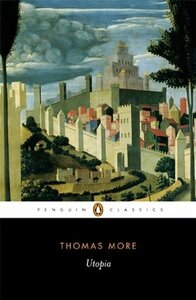You need to sign in or sign up before continuing.
Take a photo of a barcode or cover
informative
slow-paced
Plot or Character Driven:
N/A
Strong character development:
No
Loveable characters:
No
Diverse cast of characters:
No
Flaws of characters a main focus:
No
Didn't get too much out of this. Interesting in a historical context and as the origin of "utopia".
slow-paced
Thomas More has that familiar English wit you find in novels like Gulliver's Travels. That is really the highlight of this book: clever writing and clever wordplay. As far as the ideas behind Utopia are concerned, I have to say I wholeheartedly do not agree with them. Utopia is clearly a major precursor to Marx's works and the communist ideas that would later emerge during Europe's industrial age. Utopia's age is itself significant here as it shows how ideals and the concept of a "perfect" world change over time. The punishments More forwards for breaking those ideas is often violence, and that, I feel, undermines the whole Utopian project.
challenging
reflective
medium-paced
Plot or Character Driven:
N/A
Strong character development:
N/A
Loveable characters:
N/A
Diverse cast of characters:
N/A
Flaws of characters a main focus:
N/A
Even though I don’t agree with everything in this book, it’s attempt at a perfect society is too intriguing not to appreciate.
inspiring
reflective
medium-paced
Plot or Character Driven:
N/A
Strong character development:
N/A
Loveable characters:
N/A
Diverse cast of characters:
No
Flaws of characters a main focus:
No
informative
reflective
medium-paced
Plot or Character Driven:
Character
Strong character development:
No
Loveable characters:
N/A
Diverse cast of characters:
No
Flaws of characters a main focus:
Yes
It’s a good must-read, not the most captivating.
informative
medium-paced
Highly interesting as an attempt to envision an ideal society, updating Plato's work in Republic and Laws for the early modern age. More seems to pull his punches though by putting the description into the mouth of an avowed outsider (though one could say the same of Plato and Socrates) and then at the end casting doubt in his own words on how practicable or even desirable it is. There is the oddness, for us, of the ideal society engaging in warfare (albeit reluctantly) and also having (oddly happy and contented) slaves, despite slavery being illegal in England for 400 years already by then. And, although there is uncertainty over how involved More was in torturing heretics, he was certainly enthusiastic about their execution, so the long section about religious tolerance is puzzling. Also interesting as an early example of the 'fantasy discovery of new world advanced society' literature which carried on via people like Poe through to the early 20th century with Bierce and even in a way Lovecraft, while also perhaps taking some inspiration from Homer's Phaeacians.
More had some interesting ideas for his time. I had difficulty concentrating sometimes because of the way this was written as a dialogue, got mixed up with who was talking in the first book. Still very interesting. It made me wonder what More would think of our times. He'd probably kill himself. Anyway all in all iteresting ideas I will be reading again at some point. Also I do like More's irony and humor, he is quite funny when he wants to be.
